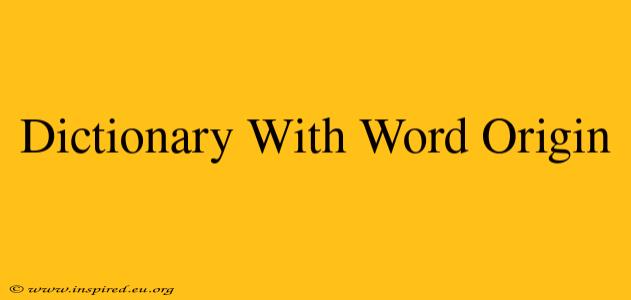Understanding the origin of words—their etymology—adds a fascinating dimension to language. It reveals the historical journeys of words, their transformations over time, and the cultural influences that shaped them. This article explores the world of etymology dictionaries, explaining their value and guiding you towards finding the perfect resource to delve into the fascinating history of words.
Why Use a Dictionary with Word Origins?
Beyond simple definitions, etymology dictionaries provide a rich tapestry of information. They illuminate the evolution of words, showing how their meanings and pronunciations have shifted across centuries and languages. This knowledge enhances vocabulary, comprehension, and critical thinking skills. For writers, understanding word origins can enrich style and add depth to their prose.
Unlocking the Secrets of Language: Benefits of Etymology Dictionaries
- Enriched Vocabulary: Learning a word's origin often reveals nuances in its meaning, expanding your understanding beyond a simple definition.
- Improved Comprehension: Knowing the history of a word can illuminate its usage in different contexts.
- Enhanced Writing: Using words with awareness of their etymological roots results in richer, more impactful writing.
- Increased Critical Thinking: Examining word origins fosters a deeper understanding of language's dynamic nature and its relationship to culture and history.
- Fascinating Exploration: Delving into etymology is inherently interesting and opens up a world of linguistic discovery.
Types of Etymology Dictionaries
Several types of dictionaries cater to different needs when it comes to exploring word origins. Some are comprehensive, while others focus on specific languages or time periods. Choosing the right dictionary depends on your specific needs and level of linguistic expertise.
Exploring Your Options: A Variety of Etymology Resources
- Comprehensive Etymology Dictionaries: These offer in-depth etymological information for a vast range of words. Examples include the Oxford English Dictionary (OED), a cornerstone of etymological research, and the Etymological Dictionary of the English Language by Friedrich Kluge.
- Specialized Etymology Dictionaries: These focus on specific languages (e.g., a dictionary of Old English etymology) or specialized fields (e.g., a dictionary of scientific terminology).
- Online Etymology Dictionaries: Websites like the Online Etymology Dictionary (etymonline.com) offer convenient access to etymological information. They often include interactive features and visual aids.
How to Use an Etymology Dictionary Effectively
To maximize the value of an etymology dictionary, approach it with a systematic method. Don't just look for the definition; explore the etymological information provided. Pay attention to the different stages of a word's development, tracing its journey through time and across languages.
Mastering the Art of Etymological Exploration: A Step-by-Step Guide
- Identify the Word: Begin with the word you're interested in exploring.
- Locate the Entry: Use the dictionary's index or search function to find the word.
- Analyze the Etymology: Examine the information provided on the word's origin, including its earliest known usage, its linguistic ancestors, and any significant changes in meaning or pronunciation.
- Trace its Evolution: Follow the word's lineage back through time, noting how its meaning and form evolved.
- Contextualize the Information: Consider the historical and cultural context in which the word developed, which can significantly impact its meaning.
Recommended Etymology Dictionaries
Choosing the right etymology dictionary depends on your needs and level of linguistic expertise. For beginners, online resources or smaller, more concise dictionaries might be a good starting point. For serious research, the OED remains the gold standard.
Top Choices for Etymology Enthusiasts
- Oxford English Dictionary (OED): The most comprehensive English language dictionary, considered the gold standard for etymological research. Available online by subscription or in print.
- Online Etymology Dictionary (etymonline.com): A free, comprehensive online resource with a user-friendly interface.
- The American Heritage Dictionary of the English Language: Provides concise but useful etymological information alongside standard definitions.
Conclusion: Embark on a Linguistic Journey
Etymology dictionaries are invaluable resources for anyone interested in exploring the richness and depth of language. They offer a window into the past, revealing how words have evolved and adapted across cultures and time. By using these dictionaries effectively, you can enhance your understanding of language, improve your writing, and uncover the fascinating stories behind the words we use every day. So, embark on your etymological journey and discover the captivating history hidden within the words you speak.
